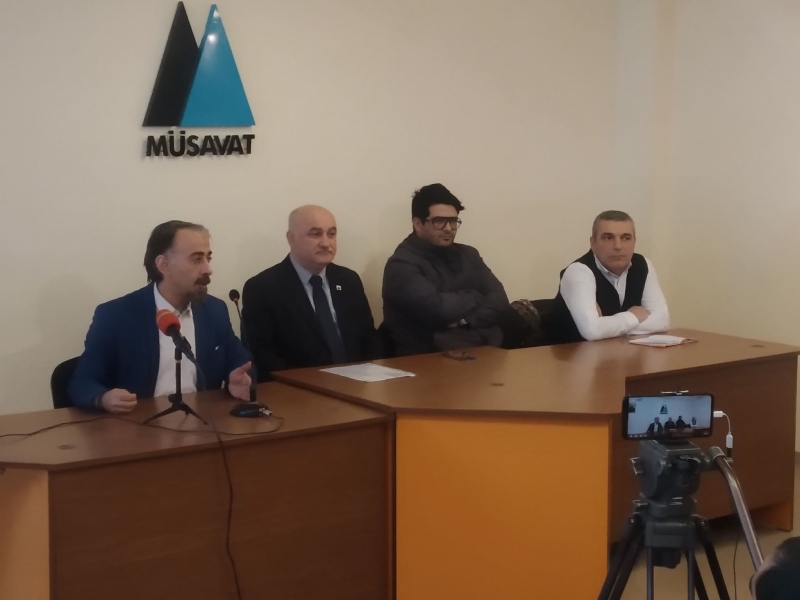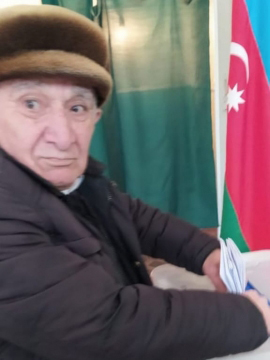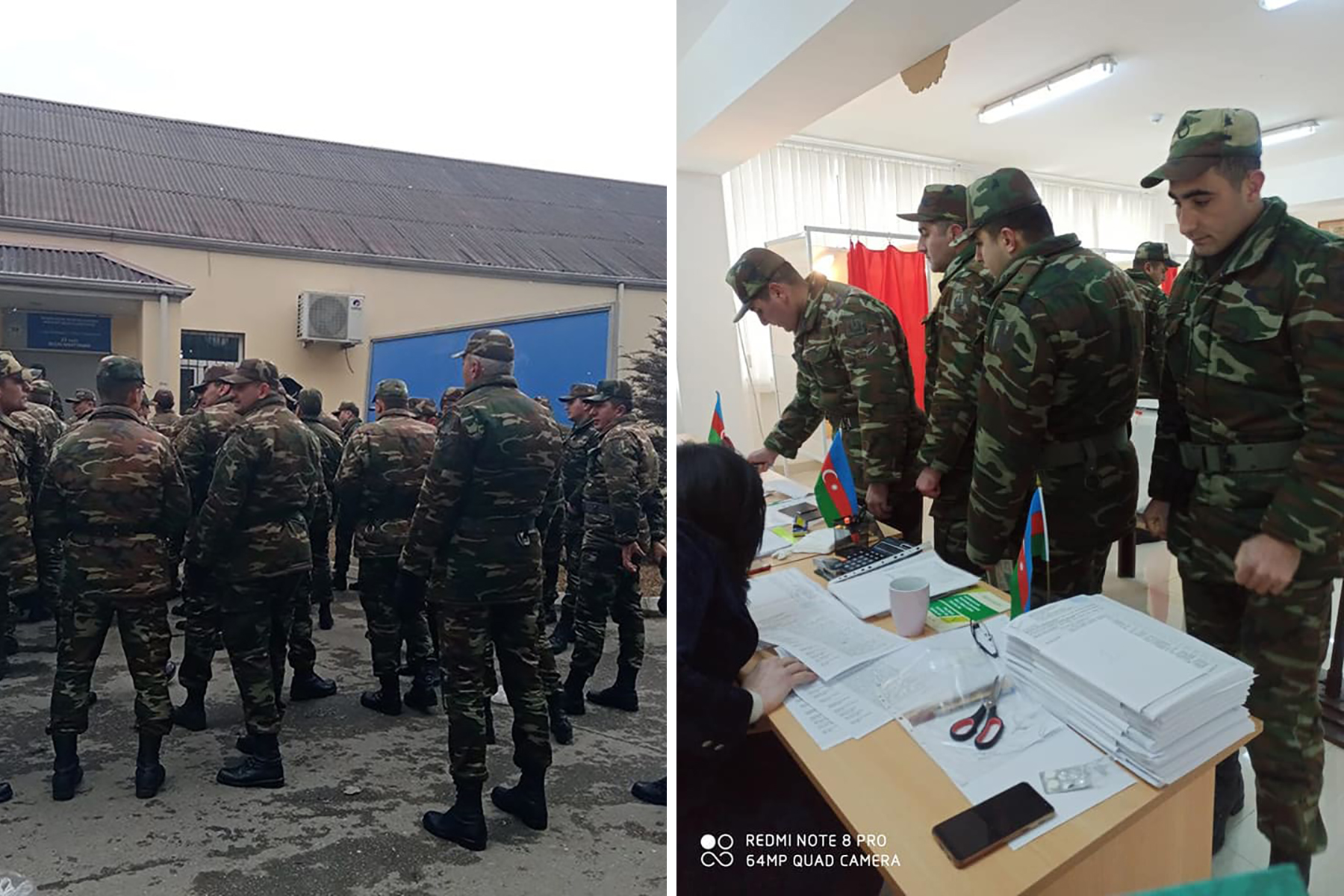Constitutional court approved final results of Azerbaijani elections

With the exception of four constituencies, where polls were scheduled, the Constitutional court of Azerbaijan approved the final results of the Central Election Committee over snap parliamentary elections held on 9 February.
The Court confirmed the final results of the Central Election Committee (CEC) on Thursday morning.
[Read more on OC Media: Azerbaijan cancels election results for ‘at least 4 constituencies’ due to electoral fraud]
According to the results, the ruling New Azerbaijan party took 70 seats at the parliament, independent candidates took 41 seats, while 10 seats were divided between the candidates of eight other parties.
Judge Rafael Gvaladze told at the plenary session that 229 complaints were addressed to the courts regarding the CEC’s results.
[Read more on OC Media: Preliminary results show almost no change in Azerbaijan parliament]
During the session several independent candidates gathered in front of the Court to protest against the ruling.
Independent candidate Farhad Mehdiyev told OC Media that no independent candidates were allowed to be present during the court session. ‘We were told that only people who are on the invited list are allowed to present at the session. And of course our names [independent candidates’] were not there’, he said.
The ruling was ‘not surprising’
Anar Mammadli, the head of the Election Monitoring and Democracy Studies Centre (EMDS), told OC Media that the ruling of the Constitutional Court was ‘not surprising’ since election results were approved without a ‘proper investigation’ in previous years as well.
‘There were more than 200 complaints’, he said. ‘Of course, a ruling over so many cases should not be taken in several hours.’
Mammadli added that domestic courts ‘once again’ proved that they are unable to fairly assess the election results, therefore, ‘the results will be evaluated by the European Court of Human Rights (ECHR)’.
Farhad Mehdiyev told OC Media that, for the candidates, the ruling was also not surprising — the courts’ decisions are ‘dictated by the government’, he said.
Independent candidate Ruslan Izzetli, the leader of opposition D18 Movement, who was a candidate in one of the four constituencies in which results were cancelled, told OC Media that the cancellation of the result of his constituency was also a ‘political decision’, though he believed that post-election protests, ‘also played a role’.
He said that he, together with political allies, would try to prevent voting fraud from taking place in these new elections, and would protest if it occured.
‘Alternative’ or ‘shadow’ parliament
On Tuesday around 60 candidates from Musavat party, Real Republicans bloc, and Movement bloc, along with a number of independent candidates, who disagreed with the final results of the CEC held a meeting at the headquarters of the opposition Musavat party.
Real party executive secretary and independent candidate Natig Jafarli proposed to establish an institution called an ‘alternative’ or ‘shadow’ parliament, consisting of the candidates for the elections from the parties and electoral blocs present at the meeting, including independent candidates.

‘Let’s talk openly, people don’t trust the elections and don’t participate in them’, he said. A ‘shadow’ parliament, he said would ‘return trust in elections’ among Azerbaijani citizens.
‘I believe that ideas and proposals of this parliament will be much more effective than in the real parliament’, he concluded.
During the meeting a new working group was created to coordinate the activities of the candidates against electoral fraud.
‘The working group will also determine the course of action for the next stage of the fight against electoral fraud, taking into account the proposals made at the meeting.’ Arif Hajili, the leader of the opposition Musavat party wrote on Facebook after the meeting. ‘I think we have entered a new stage of political struggle.’
‘Undemocratic’ elections
Preliminary results in 9 February’s elections gave the ruling New Azerbaijan Party 72 of 125 seats.
On 10 February, opposition coalition the National Council of Democratic Forces stated that the elections were falsified and ‘do not reflect the will of the people’. Similar statements came from the Umid and Real Parties.
The Musavat Party called for the cancellation of the results.

In a joint statement on 10 February, the observation missions from the OSCE and Parliamentary Assembly of the Council of Europe (PACE) called into question the results.
‘The restrictive legislation and political environment prevented genuine competition in Azerbaijan’s early parliamentary elections’, the statement said.
‘Although some prospective candidates were denied the right to stand, candidate registration was otherwise inclusive. Despite the large number of candidates, voters were not provided with a meaningful choice, due to a lack of real political discussion.’
The head of the PACE delegation, Frank Schwabe, said that ‘despite some appearance of progress in the preparation for the elections, the widespread violations of counting procedures raised serious concerns about the results of the voting in general’.
Artur Gerasymov, Special Coordinator for the OSCE observer mission said, ‘I regret very much that what could have been improvements did not lead to a competitive environment enabling truly democratic elections. Counting on election day was disappointing. I would have hoped for some real changes.’
The European Union also stated on 11 February that they ‘regret that long-standing recommendations by OSCE/ODIHR and the Council of Europe’s Venice Commission still have to be addressed. The EU stands ready to assist in this process’.

Arif Hajili, the chair of the Musavat party, stated on 11 February that Musavat and Real parties, along with the D18 organisation and independent candidates had requested permission from the Baku city administration to hold a protest on 16 February.
Ruslan Izzetli, the head of the D18 Movement, told OC Media that he was denied permission for the protest on Wednesday before being told they could hold a protest in Lokbatan, on the outskirts of Baku.
On 13 February, Azerbaijan’s Central Election Committee cancelled the results of four constituencies because of videos and images spread online of electoral violations in those districts.
[Read more: Azerbaijan cancels election results for ‘at least 4 constituencies’ due to electoral fraud]









